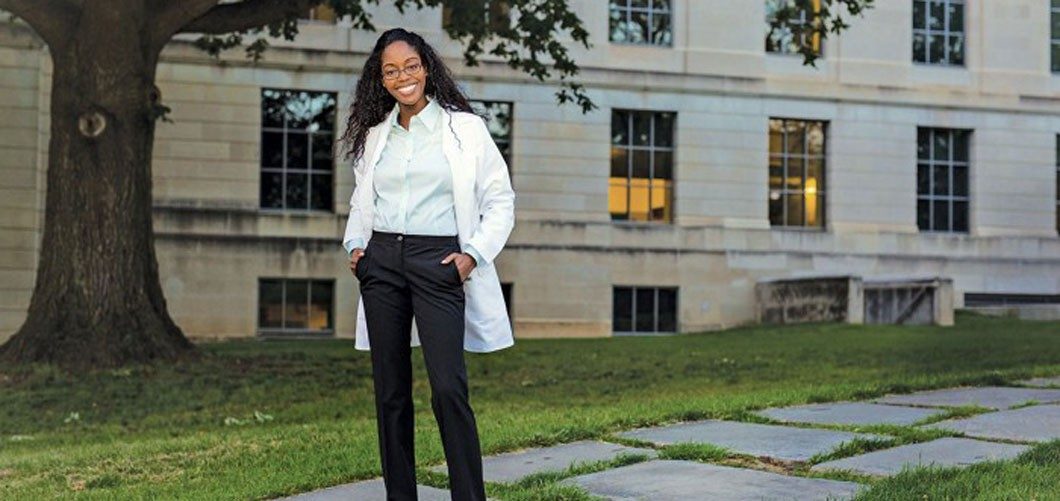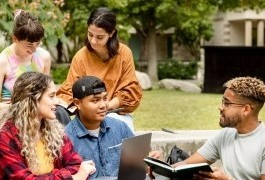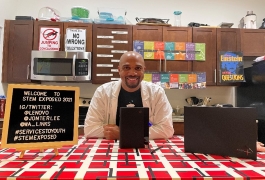ACS Scholar Alumna: Richelle Delia
Andrew Palacios, for C&EN

When Richelle Delia was growing up in the 1990s, she remembers her father encouraging her to become a chemical engineer. He said it would offer her an array of career options in multiple industries. Her father, a petroleum engineer, had been previously laid off in the 1980s oil glut, and he wanted more stability for his daughter.
When Delia started college at the University of Notre Dame in 2004, she followed her father’s advice and majored in chemical engineering. She actively participated as a student leader in a number of professional societies, including the American Institute of Chemical Engineers, the National Society of Black Engineers, and the Society of Women Engineers. She was also involved in ACS, having been selected for the ACS Scholars program during her freshman year. The experience exposed her to information about graduate school and industrial opportunities. Delia completed internships with PepsiCo, General Electric, LyondellBasell, and Deloitte.
After graduating from the University of Notre Dame, Delia pursued a PhD in chemical engineering at the University of Texas at Austin. Her graduate work focused on recreating the internal architecture of neural tissue within biopolymer hydrogel scaffolds. In other words, she used a templating method to model peripheral and central nervous system structures to help nerve cells repair after an injury or in a diseased state.
Although she enjoyed her research and its potential to eventually help a niche population, she wanted to create a real-time and systemic impact. This inspired her to complete a Fulbright fellowship at the University of the West Indies at Cave Hill in Barbados. There, she investigated the effect of glial cell response to inflammatory cytokines in an effort to mimic wound healing in an inflamed environment.
Her Fulbright experience was a direct extension of her materials-related graduate work. Her project tackled wound healing in a diabetic environment—a problem that affects nearly 20% of the adult population. Delia describes her Fulbright experience as a “more applied fruition” of her work.
After earning her PhD, she received a job offer from Owens Corning Science & Technology as an advanced engineer in R&D. She conducted life cycle assessments on insulation products, offered lectures that contributed to the zero-energy movement, and studied how carbon emissions can be reduced through policy and business. She worked in the company’s Strategic Marketing and Government Affairs departments with lobbyists on state-level residential building energy codes for proactive business development.
After realizing the gaps that exist in the quality housing supply, Delia and her real estate developer husband, John, cofounded Housing Joint Venture, a real estate investing education and development company that seeks to restore vibrancy in overlooked neighborhoods without supporting gentrification. To address the housing affordability crisis, Delia and her team are focusing on converting abandoned properties into performing assets for investors and families.
Of all the scholarships that Delia received during her academic career, she says that being part of the ACS Scholars program has been one of the most significant. “They kept in touch and they really want you to succeed,” she says. She loved that ACS invested in her ability to become a contributing member of society, especially as a chemical engineer, and connected her with other scholars at scientific conferences and meetings, some of whom are her best friends today.
Even though Delia is very busy with work, she still makes time to hang out with her husband and their puppies. She enjoys driving around neighborhoods to look at historical architecture.
One piece of advice she would give to current and future ACS Scholars would be “to take advantage of every opportunity that applies to you.” She emphasizes that “being a minority or a diverse candidate is actually an advantage because it allows you to participate in unique opportunities like the ACS Scholars program.” She also encourages students to apply to opportunities even if they don’t feel that they are ready for them. “The only limitations you have are those that you place on yourself,” she says.
Andrew Palacios, a recent ACS Scholar, just graduated from Columbia University. He will be joining Anheuser-Busch as a chemical engineer in June. This series brings together current or recent ACS Scholars with early- or midcareer alumni for a conversation. To learn about the ACS Scholars Program or to make a donation, visit www.acs.org/scholars.



